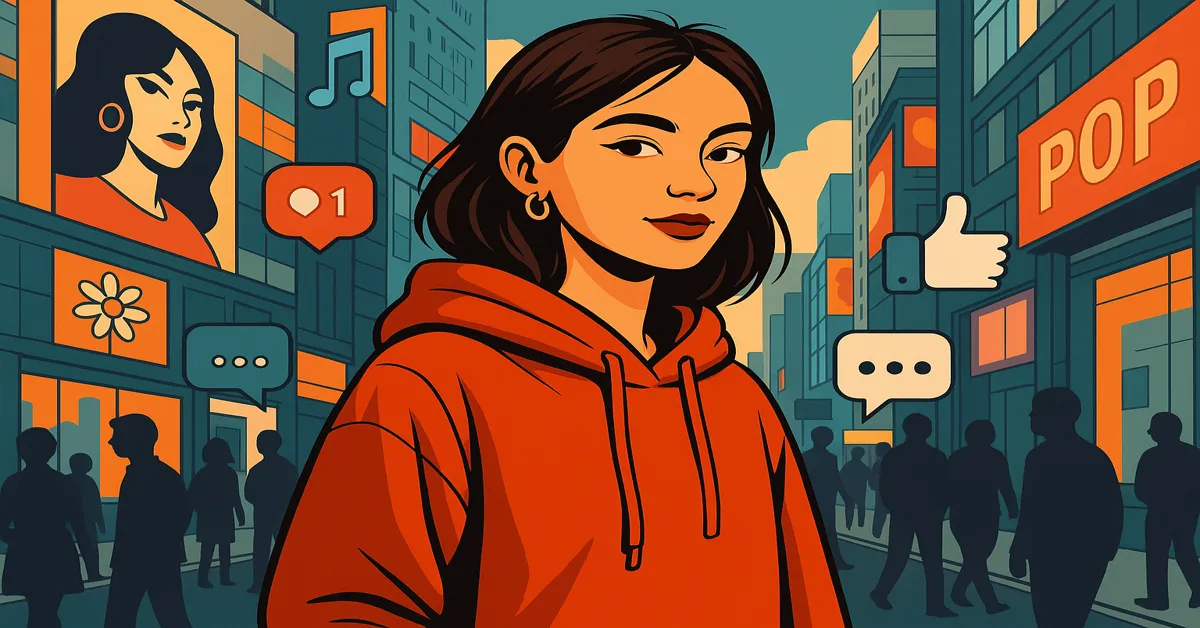In a world shaped by digital identities and fleeting trends, few names have emerged as mysteriously and magnetically as poppiilouiz. Whether you’ve heard the name whispered across TikTok timelines, embedded in experimental music tags, or cryptically referenced in digital art spaces, poppiilouiz is no longer just a username or an alias — it’s become an evolving emblem of modern creativity, individuality, and subcultural innovation. But what, exactly, is poppiilouiz?
In this article, we explore the contours of this new-age term, seeking to understand its origins, its multifaceted presence in online and offline spheres, and what it represents in a rapidly changing cultural landscape.
The Birth of a Digital Identity
Unlike traditional brands or cultural icons that arise through structured exposure and planned launches, poppiilouiz appears to have originated as an organic digital identity — perhaps a pseudonym, perhaps a concept. As with many avatars of the digital era, the strength of poppiilouiz lies not in a fixed biography but in the fluidity of interpretation. It could be the screen name of a multimedia artist in Berlin or the fictional alter ego of a New York-based sound designer. It could be a brand in the making or a protest against branding altogether.
At its heart, poppiilouiz symbolizes the ethos of internet culture in the 2020s: eclectic, undefinable, rooted in aesthetics and abstract personal expression.
Decoding the Aesthetic of Poppiilouiz
If one were to summarize poppiilouiz visually, it would be a collision of vintage surrealism with Gen-Z digital maximalism — VHS static layered with pastel GIF loops, glitched animations overlaid with nostalgic 1990s MySpace flair. Think: modern cyberpunk meets cozy-core with a twist of high-concept irony.
Online platforms like Instagram, Tumblr (still alive among niche circles), and increasingly, the algorithmically obscure corners of TikTok have hosted content tagged or associated with poppiilouiz. These posts range from digital collages and vaporwave-inspired music snippets to cryptic quotes and cinematic short videos.
It’s not just an aesthetic — it’s a moodboard of fragmented identity, unfiltered creativity, and decentralized authorship.
The Psychology Behind the Phenomenon
Why does something like poppiilouiz resonate? At a time when digital fatigue and content oversaturation dominate online spaces, there’s a growing desire for authentic, anti-algorithmic content — content that defies SEO, brand-safe visuals, and influencer polish.
Poppiilouiz appeals to this psychological need. It resists definition and marketability, yet draws attention precisely for that reason. In some ways, it’s a rebellion against the structured, monetized internet — an invitation to explore meaning rather than consume it.
Psychologists who study identity formation in the digital age note that aliases and usernames have become integral to how individuals shape their emotional and creative selves online. Poppiilouiz, whether individual or movement, functions as an alter-ego for many — a permission slip to be everything and nothing at once.
Is Poppiilouiz a Person, a Brand, or a Collective?
This is one of the more debated questions among digital subculture circles. Search results (at the time of writing) may yield minimal concrete information — a deliberate obscurity or a coincidence of emerging relevance.
Some theories posit poppiilouiz as a digital art collective — a loosely knit group of creators across cities, time zones, and disciplines using a shared identity. Others interpret it as a conceptual brand that operates outside the logic of commerce, using its presence only to ignite curiosity and discourse.
If we draw comparisons, it resembles the early days of Banksy, or more aptly, the vaporwave movement — decentralized, anonymous, and culturally disruptive.
Cultural Parallels and Artistic Relevance
To place poppiilouiz in historical context, one might compare it to movements like Dadaism or Fluxus. Both rejected the rigidity of artistic norms and embraced absurdity, interactivity, and hybridization.
Like these movements, poppiilouiz seems to blur the line between creator and audience. There’s no “official” channel — no website, no verified account — just a scattering of references, reinterpretations, and echoes. This participatory openness allows users to “become” poppiilouiz, adopting the moniker or infusing its essence into their work.
From digital zines to Spotify playlists, poppiilouiz exists more as a tone than a title — an invitation to play in the gray zones of identity and meaning.
Linguistic Dissection: Why “Poppiilouiz” Resonates
Part of the term’s allure may lie in its phonetic and visual structure. “Poppiilouiz” is whimsical, unusual, and somewhat unplaceable — a blend of “poppy” (bright, vibrant) and possibly “Louise” (a familiar human name), yet twisted into something new.
This linguistic ambiguity is not accidental. In an era of meme-driven virality and fast recognition, standing out demands novelty without alienation. Poppiilouiz manages to sound like a name you could know — and yet never heard before.
Social Commentary Through Anonymity
The genius of poppiilouiz lies not only in aesthetics or linguistics but in the refusal to be legible to algorithms. In not fitting into one category — not being a clear product, person, or platform — it critiques the very systems that demand such clarity.
Social media rewards conformity masked as originality. But poppiilouiz operates like a ghost in the machine — visible, intriguing, but just out of reach. That slipperiness becomes a form of resistance.
It invites questions rather than offers answers. In doing so, it taps into the postmodern weariness with oversimplification and the joy of complexity.
From Niche to Influence: The Spread of the Term
Despite its underground aura, signs point to the growing influence of poppiilouiz. Mentions have appeared in independent fashion lookbooks, soundscapes in Berlin raves, and even as avatars in indie gaming communities.
There’s a growing likelihood that brands — especially those vying for Gen Z and Gen Alpha markets — will attempt to co-opt the name or aesthetic. But doing so risks diluting its power. Poppiilouiz was not made for consumption; it was born out of expression.
Whether it stays niche or breaks into the mainstream will depend largely on how true it remains to its ethos — undefined, collaborative, elusive.
Poppiilouiz in the Context of Digital Folklore
Internet folklore has long been shaped by strange usernames and pseudonyms — from “slenderman” to “datboi,” from early Reddit legends to anonymous 4chan phenomena. Poppiilouiz may well be the next chapter in this digital storytelling evolution.
Like folklore, it grows through communal storytelling — users assigning meaning, remixing narratives, interpreting symbols, and expanding the universe.
It isn’t a meme. It’s a myth — one still being written.
The Future of Poppiilouiz
Looking ahead, one might wonder: What will poppiilouiz become? A decentralized media outlet? A metaverse-native art house? A cryptic NFT series with no roadmap and no explanation? Or simply a name that fades into memory, having stirred imaginations for a moment?
Whatever its future, its present is clear: poppiilouiz reflects the way we now explore identity, meaning, and creativity in a world defined by both freedom and surveillance. It reminds us that art, community, and expression need not be legible, branded, or monetized to be real.
Final Thoughts: Why It Matters
In an increasingly polished digital environment, poppiilouiz is a breath of poetic chaos. It embodies the rawness that early internet culture once championed and that younger generations crave today. It encourages curiosity, embraces contradiction, and makes space for anyone to contribute.
In the end, poppiilouiz may not be something to define — it’s something to experience, explore, and evolve with. In that, it carries forward the best traditions of art, subculture, and resistance.
And maybe, just maybe, that’s what we’ve been missing.
Read: Red Apple Chinese: Beyond Takeout—A Cultural and Culinary Institution in Modern Dining
FAQs
1. What is poppiilouiz?
Poppiilouiz is an emerging digital concept that blends identity, aesthetic, and creative anonymity. It is not tied to a single person or product but represents a broader movement of experimental self-expression found in digital art, social media, and underground creative communities. It functions more as a mood, concept, or pseudonym embraced by different individuals than as a formal entity.
2. Is poppiilouiz a brand or a real person?
The identity of poppiilouiz remains intentionally ambiguous. While it may have originated from an individual username or alias, it has since evolved into a broader cultural motif. Some speculate it represents a digital art collective or anonymous project, while others believe it’s a persona used by multiple creatives. Its strength lies in its fluidity — not being confined to one origin or definition.
3. Why is poppiilouiz gaining attention online?
Poppiilouiz resonates because it defies conventional internet norms. In an age of polished influencer content and commercialized digital spaces, poppiilouiz embraces mystery, aesthetic experimentation, and unbranded originality. This anti-algorithmic identity has attracted curious minds across TikTok, Instagram, indie zines, and underground art circles.
4. How can I become part of the poppiilouiz movement?
There’s no official sign-up or community — and that’s the point. Poppiilouiz thrives on open interpretation and creative freedom. If the spirit of it speaks to you, you can create, share, and contribute content under the poppiilouiz ethos: unfiltered, conceptual, and expressive. It invites participation, not ownership.
5. Will poppiilouiz become mainstream?
That remains uncertain — and perhaps intentionally so. If poppiilouiz maintains its core values of anonymity, decentralization, and artistic ambiguity, it may resist the mainstream or redefine what “mainstream” even means. However, its growing cultural footprint suggests it will continue influencing design, music, and digital identity conversations in unique and unexpected ways.











